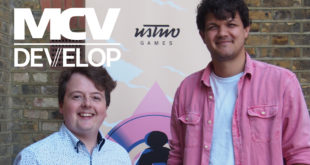The idea of developing a game for charity is an easy one to romanticise. Aside from the opportunity to prove the worth of our oft berated medium as cause for social good, there’s the potential for creative freedom, and the chance to escape the bonds typical put upon studios by the demands of retailers and marketers.
But can it really be all that good when finding the time for paid projects is already trying enough? A man who knows the answers to that question is famed PaRappa the Rapper developer Masaya Matsuura, who is readying the release of his debut OneBigGame rhythm action project WINtA.
What encouraged you to develop a title for OneBigGame? What was the appeal?
I thought that OneBigGame might be a good opportunity to test out some new ways of game production. At first we thought about developing a console game, but due to the open nature and explosive emergence of the iPhone we were finally able to see the light at the end of the tunnel.
Does developing a game for free and for charity affect the creative process at all?
Right from the start, Martin emphasised to me that this was a project to enjoy in our spare time. So in complete contrast to your usual mass production model, it was something to dip into when you had the time, and would start and stop depending on your schedule. I guess you could say it’s an exceedingly bottom-up approach.
How has your work on your OneBigGame title informed your experience as a game developer?
I think it’s given me the opportunity to take the standard structures of the rhythm game genre and experiment with more far-reached ways of distributing meta-contents.
Is it ever difficult to allocate time and resources to a charity project?
OneBigGame at times encourages us yet at times takes a step back. I think they do whatever they can to encourage a spontaneous approach to achieving our goals.
Certainly the usual severe mass-production approach to games development brings with it its fair share of resource management issues, but we can’t really compare this with the more pleasant approach evident with OBG.
However, for a small developer like us with limited resources it takes a great deal of effort to get projects like this under way.
For example, the contributions of Triangle Studios – who are undertaking the actual implementation of the game – has been huge, but nevertheless it still takes a great deal of effort to make a collaboration like this work.
Truth be told, I’ve never been a huge fan of charity work, and I don’t really feel that this is going to change to any great degree – having said that, I’m hoping that my involvement with OneBigGame will not be a one-off, but rather an on-going commitment, and I’d certainly love to drop in and out of future projects even after WINtA is done.
ManyGoodCauses
Industry veteran and former Guerrilla Games commercial director Martin De Ronde set up the OneBigGame initiative, which strives to offer hope to children’s projects the globe over, after a flash of inspiration as he digested the coverage celebrating the 20th Anniversary of the Live Aid concert.
Why, wondered De Ronde, doesn’t the games industry leverage the potential of the game developers and studios that are effectively the celebrities of one of the world’s most popular mediums? Unable to find a satisfactory answer to that question, and quick to recognise the quality of many of the unfinished projects many developers begin in their own time, De Ronde established OneBigGame.
Within a relatively short time-frame, Zöe Mode’s Chime was born, and luminaries like Matsuura and Charles Cecil were on board with projects forthcoming.
“OneBigGame in its current form couldn’t have been done in offline era,” explains De Ronde. “Not only do digital distribution systems allow us to cut a lot of corners and exist as a low overhead publisher; the famous names working for us also seemed to be ready for this.
“They are normally working on big blockbusters and over the past few years they have seen more and more small casual titles hit the limelight. So they are curious to be involved in these ‘small’ projects. And finally, as the industry is maturing and becoming mass market, it starts to become more and more important that we take a more mature approach to social responsibility.”
It appears that this opportunity to bring to realisation titles that would have otherwise languished in the back corner of hard drives is exactly what initially piqued the interest of Matsuura and his contemporaries.
“OneBigGame is a great initiative, for good causes, and it fits with our belief in games as a way of bringing people together,” says Zoë Mode’s audio director Ciaran Walsh.
“It was also an opportunity for us to do something different, with a lot of creative freedom. We experiment with a lot of creative ideas in “The Lab”, our incubator team, and OneBigGame was a chance for us to showcase that side of what we do.
And Zoë Mode’s perspective on balancing paid work with charity work?
“On one hand we had complete creative control which was a rare treat. But we also had to balance developing Chime for free alongside paying projects, so we were constrained by time and availability of people. As with any game project there are many things we’d like to have done differently or better but overall we’re really happy with how it turned out,” reveals Walsh.

 MCV/DEVELOP News, events, research and jobs from the games industry
MCV/DEVELOP News, events, research and jobs from the games industry



